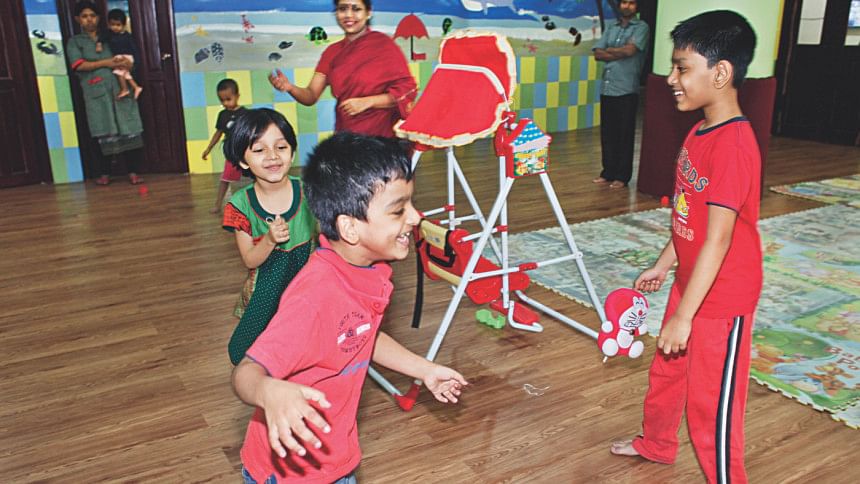Early childhood development: The right to quality care and education

Nipa, aged 12, residing in Korail slum of Dhaka, had to quit her free primary school due to her inability to cope with the orthodox educational system. She was unable to understand what was being taught in her class and was failing in exams. Driven by the curse of poverty, she now sells lighted polymeric balloons at various traffic signals. When asked, she replied with a smile, “I don’t like school. I would rather play on the streets with other kids, and sell these (raising the balloons).”
Like Nipa, such fate is shared by many children across the country who are unable to pass the basic levels of education. The lack of Early Childhood Development (ECD) among most children in Bangladesh is one major reason behind this scenario. ECD refers to the overall development of children in terms of cognition, education, nutrition, and the like. According to UNICEF, the first eight years of a child’s life are crucial and the first three years are the most important for the brain’s development. A healthy environment, free of physical and mental violence, is thus required for such growth. ECD can begin as early as the third trimester of pregnancy. During this time, parents are advised to read story books and expose children to communication, play, and proper nutrition and other stimulating elements that aid their intellectual and physical development. Such healthy exposure helps children perform better in school as well as in later stages of life.
According to a study by the Centre for Policy Dialogue (CPD) in 2016, only 13.4 percent children below age five attend ECD programmes nationally.
Zannatul Nahar, Manager, ECCD, Save the Children International Bangladesh, shares, “There is a lack of mass awareness about ECD in Bangladesh despite existing policies. Initiatives are undertaken by NGOs but that is limited.” She adds, “The amount of stimulation is low compared to nutrition among children and therefore there is a dire need to increase positive parenting, interaction and recreation.”
ECD fosters a child’s cognitive skills in such a way that by the time they start proper schooling, they are already aware about what to expect and how to react to circumstances. For example, they can imagine an apple when they hear “A for apple” and they simply do not feel like a fish out of water.
Currently, most of the organisations are working with children aged two years and above, with little or no emphasis on children below this age bracket. Natal care is not that widespread, particularly among the low-income class. Also, the type of work done by different organisations is quite similar, sticking to learning through fun and participatory activities, and in some cases providing children with nutritional food. There is a limitation in the application of diverse activities as a result of poor knowledge among the parents and caregivers and also due to lack of adequate space for playing and recreation. Also, with the advent of kindergarten schools and government scholarship at pre-primary schools, focus on ECD got sidetracked.
Unfortunately, in Bangladesh, poverty causes many children to go through domestic violence and other physical and mental abuse hindering their mental development and willingness to attend school. According to a report titled, “Understanding Children’s Rights and the Ready-Made Garment Sector in Bangladesh” by UNICEF (2018), three in every four children experience psychological hostility while two in every three experience physical retribution. Moreover, children are mostly at risk in slums, remote rural regions, and in disadvantaged minority communities where there is inadequate access to basic rights.
According to Bangladesh ECD Network (BEN), 159 organisations are working with ECD. Yet, more work needs to be done.
The Aga Khan Foundation has reached up to 33,000 children and parents since its inception in 2008 with the support of over 7,000 caregivers and educators in ECD centres through parenting and development programmes. Their current scope of work includes advancement in integrated ECD services to low-income working women, especially to those working in the garments sector in and around Dhaka city. Along with reading stories in English and Bangla, the education centres provide daycare facilities to children aged 2-6 years old. The facilitators are trained by foreign trainers from time to time as well.
Save the Children is currently providing ECD through some home-based centres, involving children in indoor-outdoor games, rhymes, songs and storytelling sessions. ECD-related training is given to parents and caregivers to enhance their familiarity on nurturing children.
Grameen Shikkha currently runs more than 10 education centres under different projects. These are mainly situated in Mirpur-11 along with a few centres in Madhobpur, Sylhet. Children aged between 5-6 years are trained to be future ready for primary schools through co-curricular activities like singing, dancing, poem recitation, drama, and other creative programmes which help assuage their fear of learning and make it seem like a fun activity.
However, challenges still prevail in terms of promoting ECD. Mohammad Abdus Samad, Assistant Manager, ECD of Grameen Shikkha, shares, “The increase in the number of small-scale kindergarten schools in local areas is driving out children from our learning centres. Since the government provides stipend, i.e. Upobritti for primary school students, many children are enrolled in primary schools with no consideration of their eligibility for it.” Furthermore, Abdus Samad says, “Grameen Shikkha initially planned to expand up to standard five within the next few years. This may be achievable in centres within
Dhaka but not areas outside, such as in Madhobpur, due to inadequate number of children available for obtaining ECD services.”
The concept of ECD is still very new to Bangladesh. Less than 14 percent of children aged 3-5 years receive early education (UNICEF, 2018). Such statistics signal a requirement of rigorous expansion of the ECD model for effective impact on children, regardless of the social strata they belong to. In this regard, Zannat opines, “The media can play a major role in disseminating information about the importance of ECD. More emphasis should also be given on implementing and upgrading the existing policies. Since children of this age group cannot make decisions for themselves, the caregivers and stakeholders need to undertake strategic actions.”

 For all latest news, follow The Daily Star's Google News channel.
For all latest news, follow The Daily Star's Google News channel. 



Comments